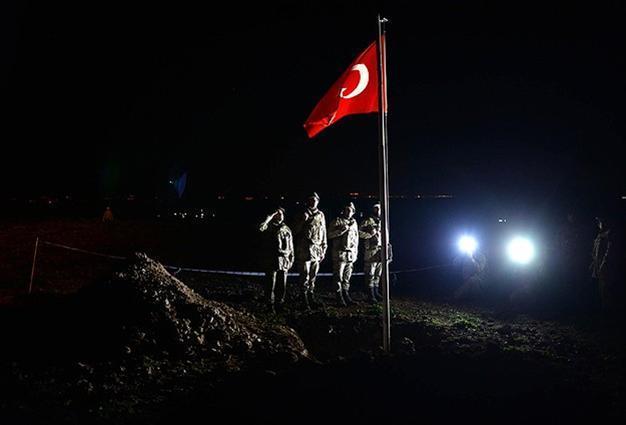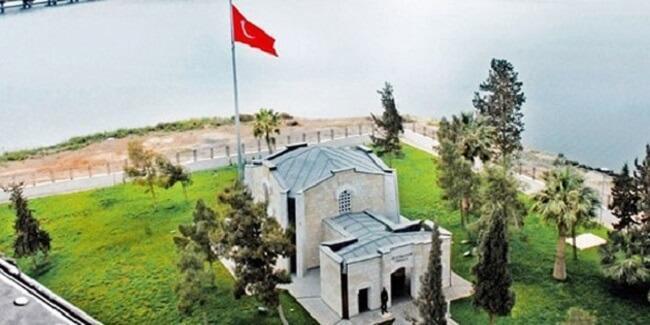Turkey relocates historic tomb in Syria over jihadist threat
ANKARA

PM Davutoğlu said Feb. 22 Turkish army took control of another area inside Syria, raising the flag, for the future transfer of Süleyman Şah artifacts. Citing international treaties, Turkey recognizes the land around the tomb as its territory, 'wherever in Syria it is.' AA photo
Turkey has evacuated its military personnel protecting the Tomb of Süleyman Şah in northern Syria as well as the artifacts in the mausoleum in an operation jointly conducted by the intelligence organization and the Turkish army, a few days after reports suggested that the tomb was besieged by jihadists belonging to the Islamic State of Iraq and the Levant (ISIL).A soldier was killed in an accident during the early hours of the operation, Prime Minister Ahmet Davutoğlu confirmed during a press conference early on Feb. 22. The soldier has been identified as Halit Avcı. Turkish President Recep Tayyip Erdoğan reportedly called the family of Avcı to convey his condolences.
The tomb, around 37 kilometers from the Turkish border, is regarded as Turkish territory by international agreements and was protected by around 40 soldiers.
Davutoğlu, Land Forces Commander Hulusi Akar and other military officials determined the details of the military operation during a meeting at Turkey’s General Staff headquarters in Ankara on Feb. 20, Hürriyet has learned. Turkish President Recep Tayyip Erdoğan approved the operation.
During the operation that was launched late Feb. 21, airborne early warning and control (AWACS) aircraft, military helicopters and drones were on duty as 39 tanks and 57 armored vehicles penetrated the border with support teams from Turkey’s Special Forces. Live footage and other data from the field were followed in an operation room at the General Staff’s headquarters.
Without engaging in any clashes, Turkish troops left Syria early Feb. 22, after detonating the symbolic building to prevent ISIL militants from using it as a base.
Davutoğlu announced in a series of tweets on Feb. 22 that the artifacts had been “temporarily” brought to Turkey, while the Turkish army “took control of an area in the Ashme region of Syria, raising our flag, where Süleyman Şah will later be transferred.”
Stressing that there is “an environment of conflict bearing every kind of risks” in Syria, Davutoğlu described the operation, named “Şah Fırat” (Shah Euphrates), as “extremely successful.”
“I want to stress that a nation can build a future only by laying a claim to its past,” Turkish PM added.
Turkey will submit a notice to the Syrian consulate in Istanbul, saying that that the placement of the tomb will be changed, Hürriyet said. Relations between Turkey and the Bashar al-Assad are extremely tense, with Ankara repeatedly proclaiming in the international arena that al-Assad should be ousted.
In a separate but brief statement, the Turkish army also confirmed that the operation was completed and that the troops and all valuable artifacts had been removed from the outpost. The army cited “security concerns and military obligations” as the reason for the evacuation operation, while reiterating that there were no clashes between the army and armed groups inside Syria.
The operation came a few days after reports suggested that the ISIL jihadists had besieged the tomb and that Turkish soldiers protecting the enclave were trapped by the militants. Foreign Minister Mevlüt Çavuşoğlu denied claims in a statement on Feb. 20. Media reports claimed that Turkey was in negotiations with ISIL militants for the release of the Turkish soldiers in exchange for arrested jihadist militants.
The Tomb of Süleyman Şah has long been in the spotlight as there were fears that it could be targeted by Syria’s government or ISIL forces. Turkey made clear to all parties fighting in the Syrian theater that it would protect the tomb and its soldiers in the enclave in the event of an attack and retaliate in kind.

Who was Süleyman Şah?
The Süleyman Şah tomb was declared Turkish territory under a treaty signed with France in 1921, when France was the colonial power in Syria. Ankara regards it as sovereign territory and repeatedly made clear that it would defend the mausoleum if it was attacked.
Süleyman Şah was a 12th-century military leader of the Seljuk Empire, which was among the first Turkish groups to enter and settle in Anatolia. He is the grandfather of Osman I, who founded the Ottoman Empire in the 13th century, which lasted for six centuries and was inherited by the Turkish Republic in 1923 following the War of Liberation.
The tomb and its annex have gone through several processes of demolition, relocation, and reconstruction since their original construction on the hills of Caber Castle in 1939. The tomb was moved to its current location in 1975 as a result of a dam construction.

















